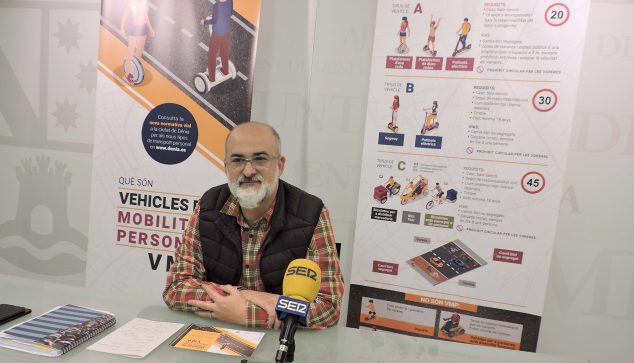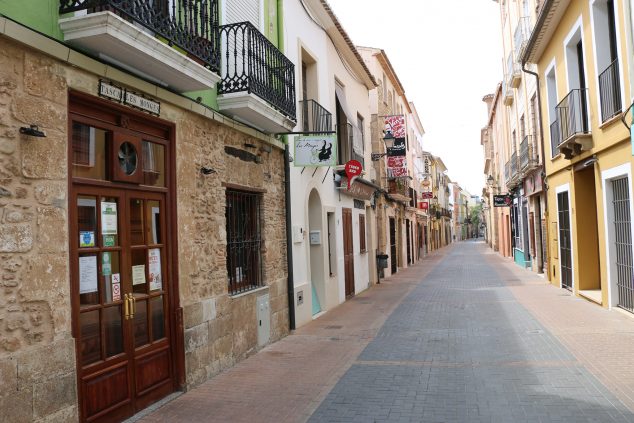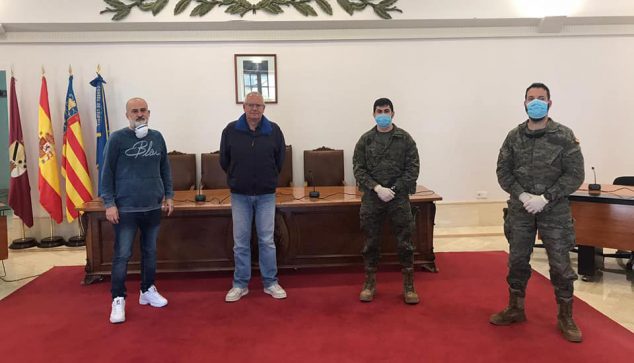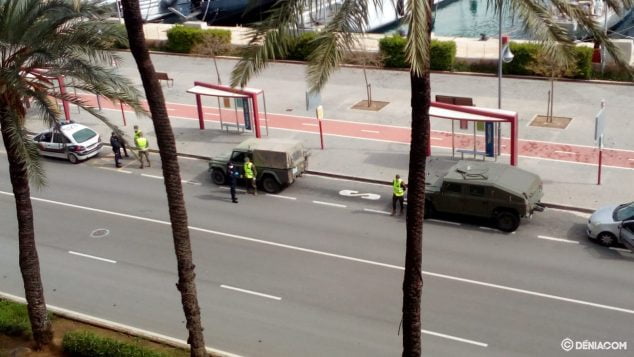We have already completed more than a month of confinement and the residents have had to adapt to different changes in terms of the restrictions decreed in the state of alarm. However, we are doing something right since Dénia is the municipality, according to a study by the Generalitat, that most respects confinement and Marina Alta the fourth region that meets the most. For this reason, our health department is one of the ones with the fewest active cases of coronavirus in the entire community.
We spoke with the councilor for Citizen Protection, Javier Scotto, to make an assessment of the confinement in Dénia, La Xara and Jesús Pobre during this first month, and to tell us how the security forces have worked to ensure that the restrictions of this exceptional situation are met.
QUESTION. How do you rate the response of the neighbors to the decree of the state of alarm?
ANSWER. The answer, very positive. And, in fact, there are data that confirm that in Dénia and the Marina Alta the confinement is being carried out. There was even talk of 96% of the population. Now, it has been announced that the Marina Alta region would be in the fourth position of compliance with the confinement. Also with the data we have of vehicles, identifications and penalties, we can say that it has been met.
It is true that the first days were days of confusion before the action. But, after a month, people already know what to do. You are being responsible and you are paying off. In addition, it is assumed that the only way to overcome the health crisis is achieved through confinement and staying at home. We are turning the curve and we do not have great contagion data either, therefore we have to congratulate the citizens of Dénia, La Xara and Jesús Pobre.
Of course, there is a minority, as always, whose violation makes a lot of noise, but they do not represent a responsible majority.
P. Exactly. Every day there have been minimum sanctions to thirty people and it seems that it does not go down. For what is this?
R. It is always a minority that looks for any excuse or that is irresponsible and even today they do not understand what a pandemic or a health crisis means. But, more or less, a review of more than 100.000 vehicles has been made, more than 2.000 people have been identified and today we will take about 600 complaints. Therefore, they represent only 10%, which are the exceptions we were talking about.
It is a minority that is not aware of the importance of staying at home, that thinks that other things that justify being on the street are more important. People, somehow, unconscious.
But there are also cases of ignorance among the 40 daily police actions, such as those who travel in a vehicle in the same row. Yes, there is a small percentage that either does not want to know or does not know. It appears that they have not yet assumed or are aware of the health information that is given.
Q. I was going to ask you that, since we also see daily the sanctions against people who are going to buy away from home. Do you think it is due to lack of information?
R. You should always go to the nearest service, both the supermarket and a pharmacy, or to walk the dog. People are aware and assume that it must be proximity. But it is also true that there are people who do not want to abandon that habit or daily routine of going to That one supermarket because it is the one you like, or to go for a walk the dog 3 kilometers from your house. There are people who resist making a responsible change in daily life, but it must be done because we are not in an everyday situation.
Afterwards, there are people that much more particular information, perhaps, does not reach him or does not want to find out, because the channels are open.
But this month there is a growth in consultations on the social networks of the City Council and the Dénia Local Police, which are constantly publishing recommendations, prohibitions and delimitations. Therefore, what we have to ask is that people continue to inform themselves.
It is true that this situation is also due to continuous changes. We passed, in a month, an alarm decree with limitations on confinement, then an extension with new conditions, limitations and prohibitions on activities and work, and now we have returned to the first situation. It is changing but people must be informed, because the channels have been opened so that people can do it.
P. As you were saying, we have lifted some measures and some have returned to their jobs. But how does it work with works? Since they have been denounced for making reforms in premises or private homes.
R. The instructions have been sent and from the channels we have always reported. In relation to the works, the activity has returned. But if it is a work that does not affect any type of address.
For example, in a new building, in which there is only the structure, the work can be carried out without any problem as long as the health instructions are always followed, the appropriate PPE is available and the distance measures are complied with.
But, then there is that part that yes there have been situations of sanctions. Works in houses or community areas that are in transit, or affect these, or use. For example, I live on a ground floor with independent access to the street. I can do a work because I do not have to use the common spaces, or elevator, stairs, patio…. But at the moment that affects the confinement of the rest, those works cannot be done.
On Friday, the case also occurred of 7 family members carrying out the reform of a premises when they did not share a home. They were denounced. That work could be done, but how it works, with the PPE, distance measures, with professional and authorized people ... But get together a whole family from different addresses to continue painting a place, and on top eating all together at a table without protection measures or anything ... that's prohibited.
P. We have seen that at Easter there have been complaints to people from other autonomous communities, presumably that they were on vacation. But it has not been as high a figure as everything pointed out, don't you think?
R. I think there was a little bit of psychosis and stigmatization. It is true that, for example, there were situations of traffic queues at the origin, but precisely caused because controls were being carried out. That does not mean that there were queues because there were thousands of cars that were going to travel to the vacation spots.
There was first the filter of the origin, then the filter of the DGT on the road and we, the last one, at the destination. But it is not true that many cars came out.
We have also been able to verify the low figures in garbage collection and water consumption. That second residents have arrived (more than tourists, since the hotels and holiday apartments are closed) is something exceptional. A large minority. Nothing to do with the volume that was discussed on social networks. And, in fact, in our interventions we have found people from other autonomous communities, but proportionally it has not been a very high number.
Q. Do you think that the controls and actions of the security forces have worked to avoid the presence of a greater number?
R. Above all, people's awareness has worked. We have received messages from people who have second homes and are eager to return, but who have preferred to stay in their usual homes. I think the first thing that has worked is raising people's awareness.
Obviously, there was also the Damocles sword that involves reporting that the devices were being prepared by the bodies and security forces. It has been the sum of all this.
P. Also in Easter you counted in two days with the support of the army. What tasks did they perform?
R. For a month, to be aware of what an alarm decree implies regarding security, all the bodies and security forces have been under the same command, following government instructions. From the first moment in which the state of alarm was decreed, the National Police and the Local Police are in constant communication. In addition, we have the Civil Guard especially for traffic.
Yes, it is true that also, and it must be said to give a vision of all that it involves in terms of security, we have had the UME, with a truck bomb and between 6 and 8 people who disinfected in sensitive points. Later, up to two occasions coinciding with the start of the weekend and bridges, we have the Special Operations Command. The first time was 6 people and the latter 8, who have dedicated themselves to the task of vehicle mobility control, but also to inform and provide security in those places where more people can meet. And, of course, security controls on the same street, premises, shops, companies ...
At the end, this month, we have had the National Police and the Local Police, with continuous reinforcements in the morning, afternoon and night, the Civil Guard, UME and the Special Operations Command.
P. And you have also had a drone that surprised a hiker in the Montgo. How does this resource help during the state of alarm?
R. Yes, in the end we have to make use of all the tools. Regarding the drone, it has already been announced that a Local Police unit was to be trained in its use. In addition, the acquisition of one is in process and about to be signed. We obtained the transfer of this to do the control.
For these situations or those with a high concentration of people, a drone allows more extensive control of the surface, reaching points of difficult access. We already had it planned and it is a tool that must be part of the daily life of municipal security, both in Dénia, La Xara and Jesús Pobre. The drone must be present throughout the coast, in the control and we will continue to use it in all cases where it can help.
Q. In addition, several people have been detained, most for disobedience. What does it mean that they are detained?
R. They are people who have either been asked to identify themselves and have not, or there has been resistance to orders to comply with the confinement.
Because when a person is asked for the identification or a justification of their presence on the street, at the moment that you do not justify it, in addition to the sanction it is required to return to your home. And there are people who disobey this order and are reluctant to abandon the public highway, which may constitute a crime of disobedience and there have already been several cases in this regard.
The criterion of disobedience is also applied when there is a repetition of sanctions. If we find a person day after day on public roads, it confirms a disobedience to the order of confinement.
Once the arrest occurs, it is made immediately available to the court electronically, although with legal assistance.
Q. Has it been easy for the resources that exist in Dénia of police to coordinate and make the patruyas of surveillance?
R. In terms of security, our resources were enough. That is, the resources are what they are. Obviously, if we could have more staff it would be better. It is true that there are not enough squads, but what we have done is expand with reinforcements.
In an emergency situation there will never be enough resources because always the more the better. But the immediate activation of reinforcements was already foreseen in a situation like this, which is what is normally done.
From the application of the alarm state what we have had to do is adapt to our resources. We have a model protocol and you adapt it, in this case, to the health crisis.
What we have done has been a reordering of services, preparing protocols for the protection of the entire workforce that is on the front line, referring the assistance and logistics issues to Civil Protection, which also works in the protection of citizens ... Yes it is true they are so specific in the alarm state that there are other services that are not covered because they are not. There is no party service, there is no traffic control service, there is no occupation of public roads.
Yes, there are resources but not as many as you would like, but you can make a spearhead and allocate the ones you have specifically to the health crisis. Everyone is concentrated where they need to be.
What we have done is to reorganize them so that the different shifts do not cross for the protection of the agents.
Q. Now that you say this, does the Artemis unit work normally?
R. Yes, it works normally. Furthermore, we are in an alarm situation in which the victims of gender violence are in a more serious situation, because they are confined with their aggressor. The Artemis unit has accepted all the protocols that have been sent to us from the Valencian Generalitat and the Government Delegation on gender violence and specific campaigns have been launched so that victims of gender violence can be informed and ask for help if they need it.
Therefore, the entire staff is focused on the health crisis, but specifically the Artemis unit is focused on its functions because we are in a more serious situation for victims of gender violence.
P. Thinking already of the future, Vicent Grimalt advanced the other day that in the summer we could be in a scenario in which we accept tourists but where we must ensure that security measures are respected, for example in the beaches. Can the police cover that job?
R. I think we will have to wait for the instructions, recommendations and limitations. It is true, as Vicent says, that a staged return to public space is planned.
I don't know what will happen to the beaches, but the resources will have to be added. It won't be just a police matter. It will also be necessary to adapt, as we have done with other groups and departments, the surveillance of the beaches or resort to material means such as drones, fences and warnings.
What you have to do is wait. We have planned as the season progresses and, towards the middle of the month of May, to hold interdepartmental meetings that directly affect the summer and what it entails, such as the use of beaches and other public spaces.
But everything depends on the instructions established by the Generalitat and the central government. I do not want to venture, but I think that many resources can be used. Above all, we must have the responsibility of citizens.
Q. When the restrictions begin to rise, little by little, I imagine that there will be more surveillance work than until now, which was basically to be careful that nobody was on the street. Do you have a plan prepared for the new possible scenarios?
R. For these cases we will have to continue to count on the resources we have with reinforcements. What we would probably do, too, is to incorporate other departments, such as Civil Protection, in the street control.
Above all, people must be informed so that they can adapt. Ultimately, control is nothing more than controlling the offender, but there is no need to be overly vigilant if people are responsible and compliant. I think it is the most important thing.
Q. And now to finish, have you heard anything about what measures could be the first to be undertaken to return to normalcy on the streets?
R. No, we have not received any information or instructions from the Delegation. Not for the moment. What we are clear about is that it will be a staggered situation, but we will not know how it will develop.
It is at the moment that we are presented that we will begin to organize and coordinate resources to adapt to the new context.













